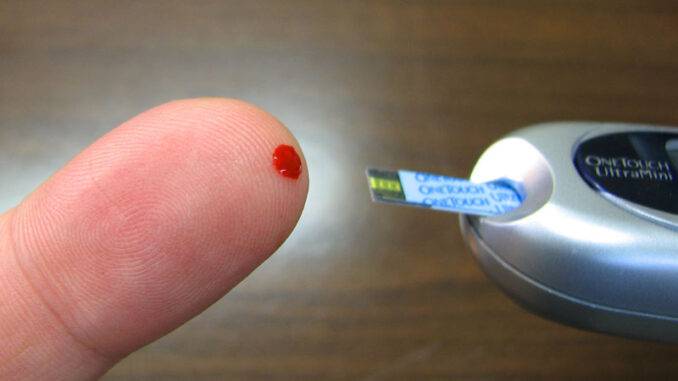
What is Diabetes, and what causes it?
Diabetes is a severe health problem that usually leads to damage or failure of many organs in the human body, including the eyes, kidneys, heart, and blood vessels.
It is a metabolic, autoimmune disorder resulting in increased blood sugar levels for a prolonged period.
Diabetes affects an average of 10% of the world population, reaching 33% in some regions. This disease is assumed to be accountable for 3.5% of chronic diseases mortality cases.
Diabetes is closely related to the influence of a hormone called Insulin, released by the pancreas. Usually, Insulin helps the sugars (glucose) from food to get into the body cells and provide them with energy. Diabetes occurs either when the pancreas does not produce insulin or the cells of our body do not respond adequately to the presence of this hormone. The latter state is also known as Insulin resistance.
That is why Diabetes is divided into two types:
- Diabetes type 1 – when the pancreas does not produce enough Insulin, and
- Diabetes type 2 – when the body cells do not respond adequately to Insulin.
There is also a third type of Diabetes, called “Gestational Diabetes”, occurring in pregnant women, similar to type 2 diabetes. Gestational Diabetes is considered a temporary health condition and usually improves or completely disappears after delivery.
The causes of Diabetes are not entirely determined, but obesity and inactive lifestyles are considered amongst its most plausible causes. At least, these are the reasons for up to 95% of diabetes cases in the United States.
How can Diabetes be controlled?
There is no known treatment for type 1 diabetes, except for insulin injections. However, type 2 diabetes, accounting for 85–90% of all cases, can be prevented and its symptoms controlled through a diet.
Let’s remind that diabetes is an autoimmune disorder. And while type 1 diabetes is destroying the cells of the pancreas that release insulin into the bloodstream, type 2 diabetes is preventing body cells from responding correctly to the presence of Insulin. In both cases, however, strengthening or instead harmonizing the immune system may help.
The first advice of medical specialists is to follow a healthy diet. Such a diet is intended to help patients control their blood sugar (glucose) levels, manage their weight, and prevent heart risk factors, such as high blood pressure and high blood fats.
A “diabetes-friendly” diet would usually include food low in carbohydrates, fats, and cholesterol but rich in protein and fiber. Additionally, dieticians suggest for all cases of diabetes the intake of probiotics as they tend to optimize the immune system which underlies this disease.
How can Kefir help?
Not surprisingly, Kefir has most of the characteristics of the diabetes-friendly diet:
- Kefir is low in carbohydrates and fats,
- Kefir lowers cholesterol levels,
- Kefir is rich in protein,
- Kefir is an abundant source of calcium, magnesium, phosphorus, and other minerals,
- Kefir is a potent provider of vitamin D, vitamin B2, vitamin B12, and other vitamins
-
Kefir contains many essential amino acids,
but more importantly, - Kefir is a rich source of probiotics
Low-carb, low-fat, low-sugar
Kefir is low-carb and may be prepared with low-fat milk, making it a low-fat product that perfectly matches any “diabetes-friendly” diet. Additionally, kefir contains many valuable nutrients and minerals that make it a precious addition to any diet aiming at blood sugar control.
While Kefir has a similar nutritional profile to milk, it has lower sugar (lactose) content than milk, resulting in lactose being converted into lactic acid during fermentation.
Induces weight-loss
An essential feature of Kefir is that it increases satiety and speeds up the metabolism, resulting in weight loss. Moreover, some probiotic species found in Kefir have been proven to affect weight and reduce belly fat directly.
So, as long as obesity and especially belly fats are considered serious contributing factors for diabetes, kefir can undoubtedly play an essential role in its control and prevention.
Regulates blood pressure
Another important asset of Kefir is its ability to regulate blood pressure. Scientists have shown that the probiotics in Kefir are beneficial for blood pressure control and have the potential for dietary treatment of hypertension. And then again, hypertension is also considered a contributing factor for diabetes.
Has anti-inflammatory effect
Both obesity and the resulting diabetes are characterized by a state of general and chronic low-grade inflammation. That’s why the proven antibacterial and anti-inflammatory properties of Kefir may be highly beneficial as a supporting and complementary part of any “diabetes-friendly” diet.
Contains probiotics
However, the most important beneficial effect Kefir may have on diabetes control is hidden in its probiotic properties.
As an autoimmune disease, diabetes is mainly dependent on guts microbiota. That is especially valid for type 1 diabetes, resulting from autoimmune destruction of pancreatic β (Beta) cells. Still, evidence exists that guts microbiota also plays an essential role in type 2 diabetes.
Scientific studies clarifying the effects of probiotics in the management of diabetes found evidence that the modulation of the intestinal microbiota by probiotics may be effective in preventing and controlling both type 1 and type 2 diabetes.
Another study focused on the benefits kefir offers compared to other fermented dairy products (like yogurt) found that fermented milk, in general, decreased fasting blood glucose levels and the level of total cholesterol. The study concluded that probiotics in fermented dairy could be helpful in the medical nutrition management of diabetic patients.
The relationship between gut microbiota, probiotics in fermented dairy products (most notably – Kefir), and diabetes seem undeniable. Microorganisms found in our guts are responsible for maintaining our immune system, essential to diabetic patients. Probiotics from kefir ensure that the right balance of these bacteria in our guts remains stable and optimal.
Finally, it is essential to state that either kefir or any other product containing probiotics may not be considered a “medication” or a way to “cure” diabetes. Instead, kefir can be helpful as a complementary or adjuvant therapy, supporting and supplementing a well-designed therapeutic dietetic plan.
Caution
Along with all that said, it would be helpful to remind that the benefits kefir offers to people with diabetes are valid for homemade natural milk kefir, prepared with pasteurized low-fat milk and healthy milk kefir grains.
Some commercially available kefir may contain added sugar to improve the taste or preservatives to increase the shelf life of Kefir but thus weaken its probiotic properties. Therefore, people with diabetes need to read carefully the labels of all products they consume.
Summary
Diabetes is a severe metabolic, autoimmune disorder affecting about 10% of the world population. Diabetes usually leads to damage or failure of many organs in the human body, including the eyes, kidneys, heart, and blood vessels.
Diabetes is divided into two types. We are talking about Diabetes type 1 when the pancreas does not produce enough Insulin and Diabetes type 2 – when the body cells do not respond adequately to the presence of Insulin.
Obesity and inactive lifestyles are considered amongst the most plausible causes of Diabetes and are the reasons for up to 95% of the cases of Diabetes in the US.
Unlike Diabetes type 1 which can be treated only with insulin injections, type 2 diabetes, accounting for 85–90% of all cases, can be controlled and its symptoms prevented through a diet.
Such a diet would usually include food that would be low in carbohydrates, sugars, fats, and cholesterol, and rich in protein and fiber. Dieticians also suggest the intake of probiotics as they tend to optimize the immune system which underlies this disease.
Kefir is the perfect example of a food that meets almost all requirements of the “Diabetes-friendly” diet. It is low in carbohydrates, sugars and fats, contains almost no cholesterol, and it is rich in protein and probiotics.
Moreover, Kefir tends to speed up metabolism which may considerably help the fight against obesity – the main risk factor for Diabetes.
Finally, like most autoimmune disorders, Diabetes is closely related to a disturbed balance in the guts microbiome (the microbial population of the gastrointestinal tract), and Kefir is known to be one of the most powerful foods able to restore the right balance between the good and the bad bacteria in the guts.
Related resources
- What is Kefir?
- Kefir benefits
- What are probiotics?
- What are microbiome and microbiota?
- Can Kefir help acid reflux?
- Kefir and IBS
- Can Kefir help SIBO treatment?
- Can Kefir help with antibiotics?
- Can Kefir help with weight loss?
- Is Kefir good for osteoporosis?
- Can Kefir help with high blood pressure?
- Is Kefir good for elderly people?



